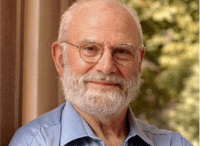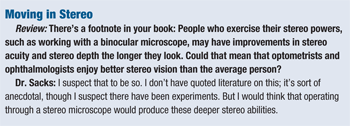Oliver Sacks, M.D., is a professor of neurology and psychiatry at the Columbia University Medical Center, and a best-selling author of neurological case histories including “The Man who Mistook his Wife for a Hat,” “An Anthropologist on Mars” and “Musicophilia: Tales of Music and the Brain.” His book “Awakenings” inspired the 1990 Academy Award-nominated film starring Robin Williams (who played the Oliver Sacks role) and Robert De Niro.

His new book “The Mind’s Eye” tells the stories of people who try to navigate the world and communicate with others despite losing what seem to be indispensable senses and abilities.
Dr. Sacks tells his own story of eye cancer and the disconcerting, and disheartening, effect of losing half of his vision.
On the publication of his new book, Review took the opportunity to talk to Dr. Sacks about stereo vision, vision therapy, and his own heartbreaking loss of vision.
Review: Stereopsis seems to go almost unnoticed by the average person. However, you may be the exception. In “The Mind’s Eye,” you describe yourself as having enjoyed “expert” stereo vision.
Dr. Sacks: First, I think stereo acuity and stereo depth are quite variable. By some accounts, 5% to 10% of the population may not have any [stereopsis]. And for the remaining 90%, it can vary from what may be called shallow stereoscopy to deep stereoscopy, and this depends on the relative emphasis of binocular over monocular cues. Nine people out of 10 say if they close an eye, it makes no difference. With me, it always made a difference. And now [that it’s lost], it makes a huge difference.
Review: The book details your ocular tumor, your partial vision loss, and the treatment you had up to the point where you finished the book. So, how are you now?
Dr. Sacks: It seems as if the retina is quietly oozing [blood] at the moment. I was hoping that the blood would clear, but it didn’t. And after eight or nine months, I had a vitrectomy. Then I was just starting to enjoy some vision in that eye again when it bled once more.
It’s been a year since I lost what vision I had, which was some peripheral vision and therefore a little bit of stereo as well. I lost that last September. And, in fact, I’ve had five procedures on the eye, and each time the eye has bled again. There’s no point in trying to take out the blood, and this pushes the pressure up in the eye, which gives me a sort of secondary glaucoma. So I take drops three times a day to hold it. But there’s no vision in that eye.
Review: I’m very sorry to hear that.
Dr. Sacks: But I still have a faint hope that at some point the retina will dry up and I may see a little bit again. I would welcome it very much, because I found both the loss of stereo vision and loss of field quite disabling in their different ways, no matter how well I seem to have adapted.
Review: In the book, you talk about how your brain fills in the vision in the scotoma. Are you still experiencing those kinds of hallucinations?
Dr. Sacks: Yes. I’m now looking up at the ceiling and I see it covered with cryptic writing, a pseudo writing. When I’m visually engaged, they don’t intrude at all. But if I disengage or look at a blank surface, then they’re there. But I ignore them, much as I ignore my tinnitus.
Review: In one of the most curious parts in the book, there’s a footnote where you say you smoked cannabis, which brought back your 3D vision for a short time.
Dr. Sacks: I don’t know what to make of that, and I never repeated it.
Review: Do you think it was an illusion, or do you think it was true stereo vision?
Dr. Sacks: Well, it enabled me to judge depth better, because when I had this experience I put out a finger where I thought the edge of a flower was, and I touched the edge of the flower. In a very limited way, I could verify the [improved] visual experience by touch.
I wondered whether a lifetime of stereoscopy, and what I might call expert stereoscopy, had given me perhaps a potential power to make a virtual image of what the blind eye might be seeing, and to compare that with a real image. Whether that power might have been facilitated by cannabis, I don’t know. I’ve received letters from others who have claimed similar experiences. Maybe it was an illusion. I don’t know how it could have happened, but it did happen.
Dr. Sacks and Stereo Sue
Last year, neurobiologist Susan Barry, Ph.D., published a book, “Fixing My Gaze,” in which she described how she surprisingly regained stereo vision as an adult, after a lifetime of living without it. Dr. Sacks wrote an article in the New Yorker about her, “Stereo Sue,” and wrote the foreword to “Fixing My Gaze.”
Review: I interviewed Dr. Barry last year when her book came out (see “An Interview with ‘Stereo Sue’,” July 2009), so I know her side of the story. Tell me about your experiences with her.
Dr. Sacks: I find her descriptions of stereo somewhat rhapsodic, saying that she thought that gaining it was as radical as how seeing in color would be for someone who was totally colorblind.
Review: She writes about her whole world being vastly improved, vastly richer than it was when she didn’t have stereo vision, and she didn’t know that it could be that way.
Dr. Sacks: And now mine is vastly poorer the same way.
Review: Were you talking with Sue Barry, who had just regained stereo vision, about the same time that you lost your stereo vision?
Dr. Sacks: No, it was before I got my diagnosis. But when diagnosed, I was struck by the irony that the very thing I’d written so lyrically about, and had been thinking about for two years, was now at risk.
Review: Dr. Barry continues to do vision therapy. When I spoke with her, she said that there’s a positive feedback loop now such that her visual improvements are strengthening those neural connections in her brain.
Dr. Sacks: Absolutely. She also found that if she did not continue her conscientious exercising and so forth, she would regress to some extent. I think whenever there has been damage to a system, or if a system is weaker than normal, then it needs strong continuing exercise. You can’t neglect it.
Review: And the brain is plastic enough to improve by that?
Dr. Sacks: Yes. Although that improvement doesn’t mean that you should stop it.
Review: Dr. Barry wrote that, as a neurobiologist, she was trained that there is a critical period of development, and once you’re past that critical period, little or no recovery is possible. In your book, you talk about how we’re learning that this is not the case, that the brain is much more plastic than we think it is.

Dr. Sacks: I think it’s more of a facilitating period, rather than an absolute critical period. Some years ago when I was writing about deafness, I was amazed to get a letter about a deaf man born in a remote village of, I think, Guatemala. This man had never been exposed to formal sign language and had no language of any sort. Such a situation would have been considered hopeless because critical periods of language seem to be so strong. But, in fact, he did acquire fairly good language as an adult.
Obviously the brain is much more plastic when one is younger. But just as obviously, various forms of learning are still possible until one’s dying day. And now, approaching 80, I prefer to think that this is so.
Review: As you say, you’re approaching 80. In your mid-70s, you went 32 months—almost three years—without an eye exam. Then you learned that you had an ocular tumor.
Dr. Sacks: That’s one of the most poignant regrets of my life—although whether it would have made any difference, no one can say.
Final Thoughts
Review: You mentioned that you are a member of the New York Stereoscopic Society. So what do you make of the new wave of 3-D movies?
Dr. Sacks: I just sent off a copy of my book to [James Cameron] the director of “Avatar.” I haven’t seen it myself. I would have adored it a few years ago, but now the thought of it makes me sad.
If it’s possible to have something like a 3-D television, I’m all for it. Stereoscopy comes and goes as a sort of fashion. There was one wave in the 1840s, one in the 1890s, one in the 1950s and one now. It seems every 50 years, stereo comes back in. But, it won’t come in for me.

